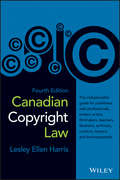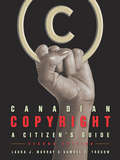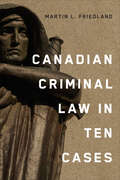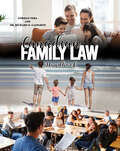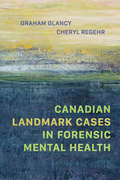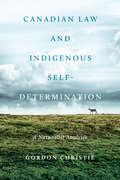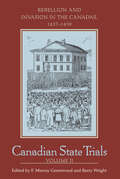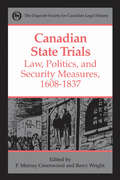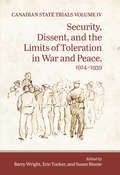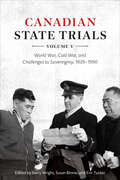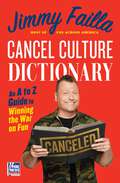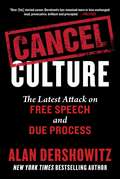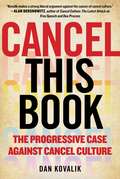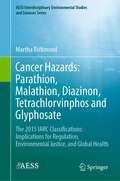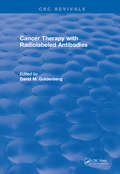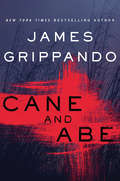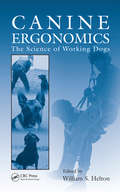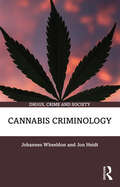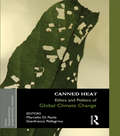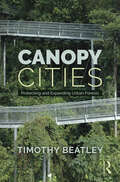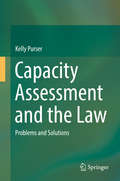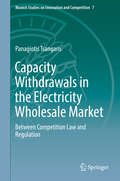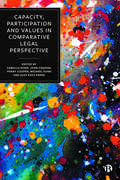- Table View
- List View
Canadian Copyright Law
by Lesley Ellen HarrisAn updated guide to Canadian copyright law for an age of reckless infringementThis fourth edition of Canadian Copyright Law brings you the latest updates according to new Canadian legislation and international agreements. Copyright infringement has always been an invisible crime. Now with near-constant access to the Internet and the mainstream explosion of digital formats, copyright is one of the most important issues for creative professionals, consumers of that media, and those who work in related industries. The line between what is protected and what is "free" is blurring further, and the copyright issues are more complex than ever. Provides a complete update on copyright issues relating to digital media.Takes the convoluted legal jargon of the Canadian Copyright Act and sets it out in everyday language. Provides concrete examples to offer further clarification of complicated matters.Whether you are a creator or user of copyright material, Canadian Copyright Law will keep you current on copyright law in Canada and its applications to your situation--to protect your creations, content, and products in these rapidly changing markets.
Canadian Copyright: A Citizen’s Guide
by Laura J. Murray Samuel E. TrosowIn the age of easily downloadable culture, messages about copyright are ubiquitous. If you’re an artist, consumer, or teacher, copyright is likely a part of your everyday life. Completely updated, this revised edition of Canadian Copyright parses the Copyright Act and explains current Canadian copyright law to ordinary Canadians in accessible language, using recent examples and legal cases.
Canadian Criminal Law in Ten Cases
by Martin L. FriedlandCanadian Criminal Law in Ten Cases explores the development of criminal justice in Canada through an in-depth examination of ten significant criminal cases. Martin L. Friedland draws on cases that went to the Supreme Court of Canada or the Privy Council, including well-known cases such as those of Louis Riel, Steven Truscott, Henry Morgentaler, and Jamie Gladue. The book addresses such issues as wrongful convictions, the enforcement of morality, Indigenous experiences with criminal law, bail and trial delay, and the impact of the 1982 Charter of Rights and Freedoms on the criminal justice system. Friedland describes in a masterful way the factual background of each case and the political, social, and economic conditions of the time. Each character – the accused, judges, and counsel – is described in detail, as are the relevant laws and procedures. Friedland includes recommendations on how the criminal justice system can be improved, such as by creating a new federal commission devoted solely to criminal justice and by the enactment by Parliament of enhanced codes of evidence and criminal law and procedure. Canadian Criminal Law in Ten Cases is an indispensable guide to understanding the criminal justice system for lawyers, students, and anyone interested in criminal law and the administration of criminal justice.
Canadian Family Law Handbook
by Norman FeraThis book provides an easy-to-understand survey of family law across Canada. For those interested in Ontario or other provinces, perhaps working toward paralegal certification, this book provides all the relevant details of family law and competencies in an organized fashion using plain language. The latest amendments to the Divorce Act concerning decision-making responsibilities, parenting time, and contact orders are fully canvassed as are new requirements for moving or relocating, and the broader definition of family violence. Indeed, not all marriages and families are harmonious. There is a thorough review of domestic abuse and resulting trauma as well as legal remedies including peace bonds, restraining orders, and civil contempt. This book also examines the client-centered, trauma-informed, anti-racist approach to providing legal services.The laws of marriage (but not solemnization), annulment, and divorce are essentially the same no matter where you live in Canada. The first six chapters are very informative about those topics and issues of parenting, child support, and financial assistance for spouses. This book also deals with disputes concerning parenting responsibilities, support, and property division that arise when the parties never married but cohabited in a conjugal relationship of some duration prior to separation.While this book is not legal advice, it provides every reader with a solid grasp of their rights and obligations in family matters. And those who will qualify as legal advisers in family disputes will benefit from the breadth of the material and the comparative approach.
Canadian Landmark Cases in Forensic Mental Health (G - Reference,information And Interdisciplinary Subjects Ser.)
by Graham Glancy Cheryl RegehrHigh profile legal cases involving individuals with mental health challenges often involve complex issues that confront previous decisions of the courts, influence or change existing social policies, and ultimately have a profound impact on the daily practice of mental health professionals and the lives of their patients. Providing in-depth context into milestone cases in forensic mental health, this book addresses issues such as the confidentiality of mental health records, criminal responsibility, fitness to stand trial, the right of individuals to refuse mental health treatment, and the duty of mental health practitioners to warn and protect individuals who may be at risk of harm at the hands of a patient. The authors explore the social and political context in which these cases occurred, incorporating court decisions, contemporaneous media articles, and legal reviews in the analysis. Graham Glancy and Cheryl Regehr, who are experts in the field of Forensic Psychiatry, draw upon their own practice, in addition to scholarly literature, to describe the impact of the decisions rendered by the courts in the area of mental health, and offer practical guidelines for professionals working at the interface of law and mental health.
Canadian Law and Indigenous Self‐Determination: A Naturalist Analysis
by Gordon ChristieFor centuries, Canadian sovereignty has existed uneasily alongside forms of Indigenous legal and political authority. Canadian Law and Indigenous Self-Determination demonstrates how, over the last few decades, Canadian law has attempted to remove Indigenous sovereignty from the Canadian legal and social landscape. Adopting a naturalist analysis, Gordon Christie responds to questions about how to theorize this legal phenomenon, and how the study of law should accommodate the presence of diverse perspectives. Exploring the socially-constructed nature of Canadian law, Christie reveals how legal meaning, understood to be the outcome of a specific society, is being reworked to devalue the capacities of Indigenous societies. Addressing liberal positivism and critical postcolonial theory, Canadian Law and Indigenous Self-Determination considers the way in which Canadian jurists, working within a world circumscribed by liberal thought, have deployed the law in such a way as to attempt to remove Indigenous meaning-generating capacity.
Canadian State Trials
by F. Murray Greenwood Barry WrightThis second volume of the Canadian State Trials series focuses on the largest state security crisis in 19th century Canada: the rebellions of 1837-1838 and associated patriot invasions in Upper and Lower Canada (Ontario and Québec). Historians have long debated the causes and implications of the rebellions, but until now have done remarkably little work on the legal aspects of the insurrections and their aftermath. Given that over 350 men were tried for treason or equivalent offences in connection with the rebellions, this volume is long overdue.The essays collected here, written by prominent Canadian historians, legal scholars, and archivists, break new ground in the existing historiography of the rebellions by presenting the first comprehensive examination of the legal dimensions of the crises. In addition to examining trials and court martial proceedings, the essays examine their political, social, and comparative contexts, including the passage of emergency legislation and executive supervision of legal responses, the treatment of women, and the plight of political convicts transported to the Australian penal colonies. Canadian State Trials, Volume Two contributes significantly to the ongoing reassessment of the rebellion period.
Canadian State Trials Volume I: Law, Politics, and Security Measures, 1608-1837
by Barry Wright Frank Murray Greenwood]State trials reveal much about a nation's insecurities and shed light on important themes in political, constitutional, and legal history. In Canada, perceived and real threats to the state have ranged from dissent, disaffection, and the emergence of threatening ideologies to insurrection, riot, violent protest, and military invasion. The Canadian State Trials series will explore the role of the law in regulating such threats, from the period of early European settlement to 1971. The first volume and the planned series as a whole present a great deal of new material by prominent Canadian historians and legal scholars. Although certain Canadian political trials and security crises have received scholarly attention in the past, there has never been a comprehensive and systematic examination of the country's surprisingly rich record in this area. The eighteen essays in Volume I examine this record for the period 1608-1837, covering proceedings in New France, the four Atlantic colonies, the Old Province of Quebec, and the two Canadas. They highlight security law during the American revolution, the wars against revolutionary/Napoleonic France, and the War of 1812; comparative treason law; and the trials of David McLane, Robert Gourlay, Francis Collins, and Joseph Howe, among others. The essays, which extensive use of primary sources (the most illuminating of which appear in a documentary appendix), place the examination of the law and its administration during these events in socio-political and comparative context.
Canadian State Trials, Volume IV
by Eric Tucker Barry Wright Susan BinnieThe fourth volume in the Canadian State Trials series examines the legal issues surrounding perceived security threats and the repression of dissent from the outset of World War One through the Great Depression. War prompted the development of new government powers and raised questions about citizenship and Canadian identity, while the ensuing interwar years brought serious economic challenges and unprecedented tensions between labour and capital. The chapters in this edited collection, written by leading scholars in numerous fields, examine the treatment of enemy aliens, conscription and courts martial, sedition prosecutions during the war and after the Winnipeg General Strike, and the application of Criminal Code and Immigration Act laws to Communist Party leaders, On to Ottawa Trekkers, and minority groups. These historical events shed light on contemporary dilemmas: What are the limits of dissent in war, emergencies, and economic crisis? What limits should be placed on government responses to real and perceived challenges to its authority?
Canadian State Trials, Volume V: World War, Cold War, and Challenges to Sovereignty, 1939–1990 (Osgoode Society for Canadian Legal History)
by Wright, Tucker, and BinnieThe fifth and final volume of the Canadian State Trials series examines political trials and national security measures during the period of 1939 to 1990. Essays by historians and legal scholars shed light on experiences during the Second World War and its immediate aftermath, including uses of the War Measures Act and the Official Secrets Act with the unfolding of the Cold War and legal responses to the FLQ (including the October Crisis), labour strikes, and Indigenous resistance and standoffs. The volume critically examines the historical and social context of the trials and measures resulting from these events, concluding the first comprehensive series on this important area of Canadian law and politics. The fifth volume’s exploration of state responses to real and perceived security threats is particularly timely as Canada faces new challenges to the established order ranging from Indigenous nations demanding a new constitutional framework to protestors challenging discriminatory policing and contesting public health measures. (Osgoode Society for Canadian Legal History)
Cancel Culture Dictionary: An A to Z Guide to Winning the War on Fun
by Jimmy FaillaYou may know Jimmy Failla as the best dressed man in cable news. A force multiplier of positive energy on the radio who sounds like he gets paid in Tequila and Tide Pods. But he’s also a former New York City Taxi Driver who’s spent countless hours conversing with people from all over this planet and several planets you’ve never heard of. It’s those chats with hobbits, hookers, and time travelers that fill The Cancel Culture Dictionary with the unique perspective and savage self-awareness we need to escape the outrage era society is stuck in. Let’s face it. Life in this country was WAY better before the Smart Phone came along and made us infinitely dumber. Social Media has turned our “shining city on a hill” into a Real Housewives episode on Bravo where every day is a constant cat fight about politics. Weaponized censorship and runaway speech policing has left many people unable to tell the difference between a comedian and a criminal. Although to be fair, sometimes they’re the same, in Bill Cosby’s case. But if there’s one thing we can all be sure of, it’s that spending the past 10 years with our faces glued to our phones has made us crankier, crazier, and much fatter, despite what the Instagram Filters show you.This book is a collection of naughty jokes and nutty people whose stories guide us to a world where we don’t spend all day slugging it out on Twitter, X, or whatever dumb name Elon Musk gives it next time he gets stoned. No, it's not an actual dictionary, although the author should probably spend more time reading one. Think of it as a ridiculous roadmap to a time where life didn’t revolve around the Republican Party and the Democratic Party because we were all too focused on The Keg Party. And unlike other works devoted to the cancel craze, we'll show how the people who lost the most with each celebrity firing were everyday Americans who had nothing to do with it.Cancel Culture and the outrage era have dragged us all into a war on fun. But this book is not a call to arms, girlfriend. If anything, it’s a call to chill the f**k out. So hop in, shut the door, and don’t waste time fiddling with the seatbelt. The way we’re about to drive, it can’t help you anyway.
Cancel Culture: The Latest Attack on Free Speech and Due Process
by Alan DershowitzIn Cancel Culture, Alan Dershowitz—New York Times bestselling author and one of America&’s most respected legal scholars—makes an argument for free speech, due process, and restraint against the often overeager impulse to completely cancel individuals and institutions at the ever-changing whims of social media-driven crowds. Alan Dershowitz has been called &“one of the most prominent and consistent defenders of civil liberties in America&” by Politico and &“the nation&’s most peripatetic civil liberties lawyer and one of its most distinguished defenders of individual rights&” by Newsweek. Yet he has come under intense criticism for his steadfast and consistent championing of those same principles, and his famed &“shoe‑on‑the‑other‑foot test,&” to those who have been &“cancelled&” for any number of faults, both real and imagined. Cancel Culture is a defense of due process, free speech, and even-handedness in the application of judgment. It makes the case for restraint and care in decisions about whom and what to cancel, boycott, deplatform, and bar from public life, and offers recommendations for when, why, and to what degree these steps may be appropriate, as long as objective, fair-minded criteria can be determined and met. While Dershowitz argues against the worst excesses of cancel culture—the rush to judgment and the devastating results it can have on those who may be innocent, the power of social media to effect punishment without a thorough examination of evidence, the idea that historical events can be viewed through the same lens as actions in the present day—he also acknowledges that its defenders ostensibly try to use it to create meaningful, positive change, and notes that cancelling may itself be a constitutionally protected form of free speech. In the end, Cancel Culture represents an icon in the defense of free speech and due process reckoning with the greatest challenge and threat to these rights since the rise of McCarthyism. It is essential reading for anyone interested in or concerned about cancel culture, its effects on our society, and its significance in a greater historical and political context.
Cancel This Book: The Progressive Case Against Cancel Culture
by Dan KovalikExamining a phenomenon that is sweeping the country, Cancel This Book shines the spotlight on the suppression of open and candid debate. The public shaming of individuals for actual or perceived offenses, often against emerging notions of proper racial and gender norms and relations, has become commonplace. In a number of cases, the shaming is accompanied by calls for the offending individuals to lose their jobs, positions, or other status. Frequently, those targeted for &“cancellation&” simply do not know the latest, ever-changing norms (often related to language) that they are accused of transgressing—or they have honest questions about issues that have been deemed off-limits for debate and discussion. Cancel This Book offers a unique perspective from Dan Kovalik, a progressive author who supports the ongoing movements for racial and gender equality and justice, but who is concerned about the prevalence of &“cancelling&” people, and especially of people who are well-intentioned and who are themselves allied with these movements. While many progressives believe that &“cancelling&” others is a form of activism and holding others accountable, Cancel This Book argues that &“cancellation&” is oftentimes counter-productive and destructive of the very values which the &“cancellers&” claim to support. And indeed, we now see instances in the workplace where employers are using this spirt of &“cancellation&” to pit employees against each other, to exert more control over the workforce and to undermine worker and labor solidarity. Kovalik observes that many progressives are quietly opposed to this &“Cancel Culture&” and to many instances of &“cancellation&” they witness, but they are afraid to air these concerns publicly lest they themselves be &“cancelled.&” The result is the suppression of open debate about important issues involving racial and gender matters, and even issues related to how to best confront the current COVID-19 pandemic. While people speak in whispers about their true feelings about such issues, critical debate and discussion is avoided, resentments build, and the movement for justice and equality is ultimately disserved.
Cancer Hazards: The 2015 IARC Classifications: Implications for Regulation, Environmental Justice, and Global Health (AESS Interdisciplinary Environmental Studies and Sciences Series)
by Martha RichmondThis book focuses on a monograph published in 2017 by the International Agency for Research on Cancer (IARC), an agency of the World Health Organization (WHO), discussing its carcinogen hazard classification of four pesticides: parathion, malathion, diazinon, and tetrachlorvinphos as well as the herbicide glyphosate. The monograph provided a detailed discussion of considerations and conclusions made by a group of experts who met in 2015 to evaluate these compounds. Although not universally true, many of these substances, from the time of their commercial introduction to their present-day use, have spread significantly in the environment, affecting animals and plants in the larger ecosystem, the overall health of the environment, and human health. This book develops each of these issues before turning to the IARC review process, both the general process and its evolution over time, and compound selection criteria and deliberations regarding the substances discussed in the 2017 monograph. Final book sections detail scientific and private sector reactions to and implications of the IARC classifications. Hazard identification is contrasted with various models of quantitative risk assessment. The last chapters highlight the importance of hazard identification for members of domestic and global underserved communities involved in farming and landscape work, where exposures may vary widely, are not well-regulated, and where health outcomes are often not carefully documented.
Cancer Therapy with Radiolabeled Antibodies
by David M. GoldenbergCancer Therapy with Radiolabeled Antibodies explores the most current experimental and clinical advances in the newly emerging field of cancer radioimmunotherapy (RAIT). Providing a multidisciplinary and international context, some of the world's leading experts examine the problems and prospects of RAIT from radiation, immunological, chemical, physical, physiological, and clinical perspectives with both overviews and original research.Discussions cover the up-to-date clinical results in the RAIT of ovarian, breast, colorectal, and brain cancers, as well as the current status of RAIT in the management of B cell lymphomas. Radiobiology, dosimetry, radiochemistry, targeting biology in experimental models, clinical experiences in hematopoietic and solid tumors, and new approaches to improve cancer radioimmunotherapy are also discussed. In addition, new dosimetry concepts, new labeling methods, new concepts of antibody pharmacokinetics, and new methods to enhance selective cancer radioimmunotherapy are included.
Cane and Abe
by James GrippandoIn this spellbinding new novel of suspense from New York Times bestselling author James Grippando, Miami's top prosecutor becomes a prime suspect in his wife's disappearance, which may have a chilling connection to the woman he can't forget.Unbelievable was the word for her. Samantha Vine was unbelievably beautiful. It was unbelievable that she'd married me. Even more unbelievable that she was gone. . . .Samantha died too soon. Abe Beckham's new wife has helped him through the loss, but some say it was a step back for Abe to marry Angelina, a love from his past. Abe doesn't want to hear it, and he's even managed to remain a star prosecutor at the Miami State Attorney's Office through his ups and downs.Then everything goes wrong. A woman's body is discovered dumped in the Everglades, and Abe is called upon to monitor the investigation. The FBI is tracking a killer in South Florida they call "Cutter" because his brutal methods hark back to Florida's dark past, when machete-wielding men cut sugarcane by hand in the blazing sun.When Angelina goes missing, the respected attorney finds himself under fire. Suspicion surrounds him. His closest friends, family, professional colleagues, and the media no longer trust his motives. Was Angelina right? Was their marriage not what they'd hoped for because he loved Samantha too much? Or was there another woman . . . and a husband with a dark side who simply wanted his new wife gone?
Canine Ergonomics: The Science of Working Dogs
by William S. HeltonSince Canis lupus familiaris first shared a fire with man more than 15,000 years ago, dogs have been trusted and valued coworkers. Yet the relatively new field of canine ergonomics is just beginning to unravel the secrets of this collaboration. As with many new fields, the literature on working dogs is scattered across several non-overlapping disci
Canine Olfaction Science and Law: Advances in Forensic Science, Medicine, Conservation, and Environmental Remediation
by Tadeusz Jezierski John Ensminger L. E. PapetThe value of the canine nose is well-documented, and working dogs are being utilized for their olfactory skills in an increasing number of fields. Not only are dogs used by police, security, and the military, but they are also now used in forensic science, in medical detection of disease, in calculating population trends of endangered species and e
Cannabis Criminology (Drugs, Crime and Society)
by Johannes Wheeldon Jon HeidtCannabis Criminology explores the prohibition, decriminalization, and liberalization of cannabis policy through the lens of criminological and sociological theory, essential concepts, and cannabis research. It does so by focusing on five thematic areas: law, society, and social control; police and policing; race, ethnicity, and criminalization; the economics of cannabis use; and cannabis use and crime. It is the first book on cannabis since President Joe Biden signed an executive order in 2022 to pardon citizens and lawful permanent residents convicted of simple cannabis possession under federal law and DC statute. Cannabis is now legal in some form in 37 US states. To understand the reform of cannabis policy and the challenges to come, we first need to understand the connections between cannabis and criminology. The book links key areas in past and contemporary cannabis research to criminological and sociological theories, including key concepts, emergent concerns, and new directions. Based on an up-to-date review of this growing area of research, the book outlines a research program based on five essential thematic areas. Introducing cannabis as a critical case study in moral-legal re-negotiation, it outlines how cannabis prohibition has influenced cannabis around the world. Five discrete chapters focus on thematic areas, criminological and sociological theories, define essential concepts, and provide research focused on law, society, and social control (Chapter 2), police and policing cannabis (Chapter 3), race, ethnicity, and criminalization (Chapter 4), the economics of cannabis (Chapter 5), and cannabis and crime (Chapter 6). The book concludes by presenting new ways to engage prohibitionist thinking, by challenging myths, embracing social media, and developing a duty of care to guide future cannabis researchers and explicitly involve people who use cannabis. Cannabis Criminology will be of interest to a variety of readers, including students and scholars from a range of backgrounds studying drug use, drug policy, cannabis legalization, and other drug-related issues. It will also appeal to policymakers who want to know more about cannabis legalization and drug prohibition, those working in the criminal justice system, and social work professionals. Due to its accessible style, people involved in the cannabis industry, as well as cannabis users may also find the book interesting.
Canned Heat: Ethics and Politics of Global Climate Change (Ethics, Human Rights and Global Political Thought #6)
by Marcello Di Paola Gianfranco PellegrinoClimate change is a key challenge in the contemporary world. This volume studies climate change through many lenses: politics, law, ethics, philosophy, religion, and contemporary art and culture. The essays explore alternatives for sustainable development and highlight oft-overlooked issues, such as climate change refugees and food justice. Designed as four parts, the volume: first, offers an astute diagnosis of the political and moral intricacies of climate change; second, deals specifically with topics in the political theory of climate change governance; third, focuses on the moral theory of climate change; and, finally, analyzes the specific ramifications of the climate change problem. With contributions from experts across the world, this will be especially useful to scholars and students of climate change studies, development studies, environmental studies, politics, and ethics and philosophy. It will also interest policy-makers, social activists, governmental and non-governmental agencies, and those in media and journalism.
Canon Law and the Letters of Ivo of Chartres
by Christof RolkerThe series Cambridge Studies in Medieval Life and Thought was inaugurated by G. G. Coulton in 1921; Professor Rosamond McKitterick now acts as General Editor of the Fourth Series, with Professor Christine Carpenter and Dr Jonathan Shapard as Advisory Editors. The series brings together outstanding work by medieval scholars over a wide range of human endeavour extending from political economy to the history of ideas. Book jacket.
Canopy Cities: Protecting and Expanding Urban Forests
by Timothy BeatleyThis book provides a comprehensive overview of the essential role of trees and forests in cities and examines the creative approaches cities around the world are taking to protect trees and expand their urban forests. Moving beyond the view that trees are luxuries and therefore non-essential to the life of a city, the book examines urban tree policies and approaches that foster tree protection, including tree codes and bylaws, and calls for greater community engagement to preserve this important facet of urban life. Through an international range of examples and case studies, featuring cities in the United States, Canada, Singapore, the Netherlands, Australia, France, New Zealand, Mexico, Sierra Leone, and the United Kingdom. The book offers best practice examples where trees have been further integrated into the fabric of urban planning and design, including forested towers, interior rainforests, tiny urban forests, and metropolitan forests. Written by a leading authority in the field, this is a fascinating read for researchers, students, and practitioners in urban planning, landscape architecture, and environmental policy and planning.
Capacity Assessment and the Law: Problems and Solutions
by Kelly PurserThis book discusses theoretical issues, standards, and professional considerations arising when legal and health practitioners undertake legal capacity assessments in the context of wills, enduring powers of attorney and advance health directives. The potential loss of cognition can erode autonomy as individuals lose the ability to make their own legally recognised decisions. This is an inescapable problem with significant legal, social, health and policy repercussions. This work synthesises and critically analyses the existing literature, including some of the best assessment models and guiding principles internationally, to generate a new methodology and understanding of what capacity assessment best practice means. This includes the impact of assessments on individual autonomy - the ideal method building upon respect for both autonomy as well as fundamental human rights. The triggers to assess capacity, who to involve in the assessment process, as well as how to conduct that assessment process are discussed. The crucial relationship between the legal and health professionals involved in assessments, including growing concerns around practitioner liability, is also explored. This analysis is undertaken through the innovative use of a therapeutic jurisprudence lens, the effect of which is to contribute new knowledge to this complex field.
Capacity Withdrawals in the Electricity Wholesale Market: Between Competition Law and Regulation (Munich Studies on Innovation and Competition #7)
by Panagiotis TsangarisThis book examines the issue of capacity withdrawals in the electricity wholesale market. Electricity generators can exercise market power in the wholesale market either by withdrawing generation capacity, or by pricing above competitive levels in order to achieve a higher market price and, thereby, increase revenues. After a comprehensive explanation of capacity withdrawal practices and the issues that arise when proceeding under competition law, the book analyses whether an increased state of transparency, as provided for in the REMIT and Regulation 543/2013, could facilitate the efficient functioning of electricity wholesale markets and the investigation of capacity withdrawal practices. It also examines the effect of the prohibition of market manipulation as prescribed in the REMIT in dealing with abusive capacity withdrawals in the electricity wholesale market.
Capacity, Participation and Values in Comparative Legal Perspective
by Camillia Kong, John Coggon, Penny Cooper, Michael Dunn andWith contributions from an international team of experts, this collection provides a much-needed international, comparative approach to mental capacity law. The book focuses particularly on exploring substantive commonalities and divergences in normative orientation and practical application embedded in different legal frameworks. It draws together contributions from eleven different jurisdictions across Europe, Asia and the UK and explores what productive or unproductive values and practices currently exist. By providing a detailed comparison of how legal and ethical commitments to persons with disabilities are framed in capacity law across different national systems, the book highlights the values and practices that could lead to changes that better respect persons with disabilities in mental capacity regimes.
